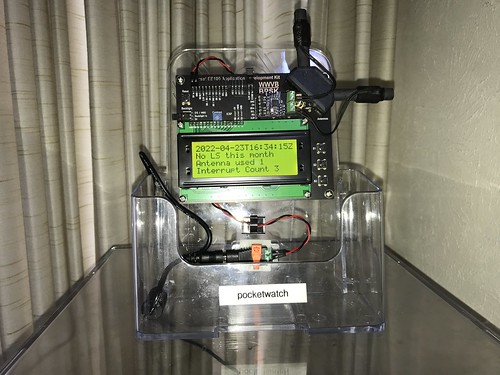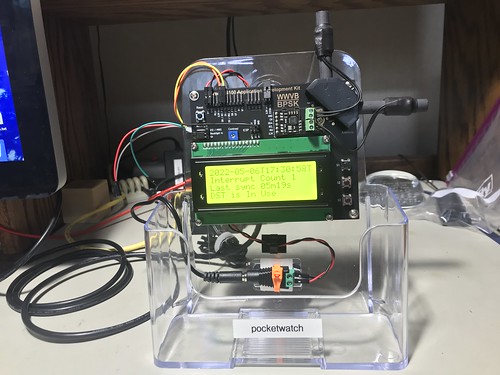Here, in reverse chronological order, are photographs of my latest clock, codenamed Pocketwatch, that joins its kin at the Palatial Overclock Estate. It is based on the Application Development Kit (ADK) for the EverSet ES100-MOD receiver module.
(Since first publishing this post, I modified the firmware that comes with the ADK. See the update at the bottom.)
The top line on the LCD display is always the time in UTC (or "Zulu" in military nomenclature, hence the "Z"), while the lower three lines scroll with various status messages.
This clock differs from my other disciplined (that is: derives its time and frequency from an external source) clocks. This was was a kit, from Windsor Ontario-based Universal Solder (yes, that's a pun), not my own design. It is not a Network Time Protocol (NTP) server and it is not connected to my home network. It is based on an Arduino-type microcontroller (firmware included), instead of a Raspberry Pi running Linux. And while it is disciplined to the NIST radio time signal, unlike my own "radio clock" (my preferred term to the incorrect "atomic clock" as you often see these devices referred to), this one receives and decodes the newer (and better) Binary Phase-Shift Keying (BPSK) modulated signal from WWVB near Fort Collins Colorado.
Another improvised mounting fixture from one of my favorite maker suppliers, Office Depot. They're used to me now: "What can I help you find?" "Well... I'm looking for something on which I can mount a printed circuit board. I'm not sure what I need, but I'll know it when I see it." "Oh... okay, I'll just let you be, then."
This was a pretty ambitious project, in terms of assembly, for an old software guy like me. Once again I am reminded of the joy of using good tools, like my Weller thermostatically controlled soldering iron, or my PanaVise vise. This build was complicated enough that I was a little surprised (and relieved) that it worked the first time.
Eventually there will be four different printed circuit boards (PCBs): this motherboard, a carrier board for the tiny radio receiver that is on its own additional little board, and the LCD board.
This kit was remarkably inexpensive for what it was. I did have to add an 5VDC power brick to it. I've purchased individual parts from Universal Solder in the past, including the WWVB AM radio module that I used in my own radio clock.
Update (2022-05-06)
Here is my modified ADK displaying the local time for my time zone (MST) taking DST into account (MDT). It should automatically adjust the local time as DST goes into and out of effect.
I modified the firmware that Universal Solder provided pre-burned into the Arduino-like AVR microcontroller. You can now use the S1 and S3 push buttons provided by the ADK to move the time zone ahead or behind UTC by one hour per press. The S2 button can be used to enable or disable Daylight Saving Time (because not all U.S. states in each of its four time zones use DST). You can find my modifications in the Pocketwatch repository on GitHub.
https://github.com/coverclock/com-cranequin-pocketwatch





No comments:
Post a Comment